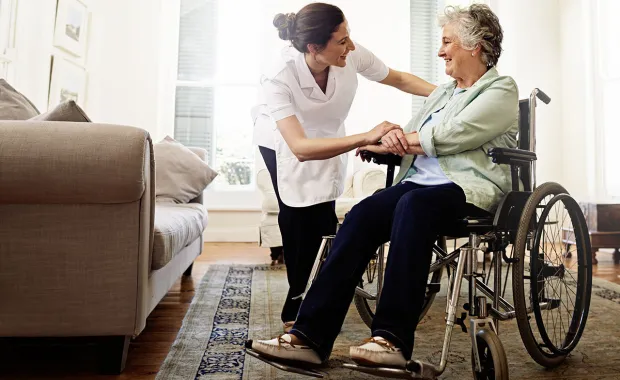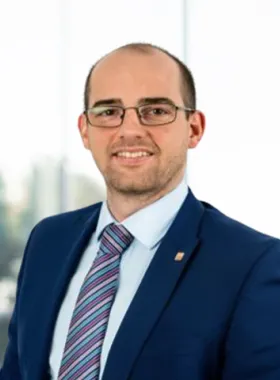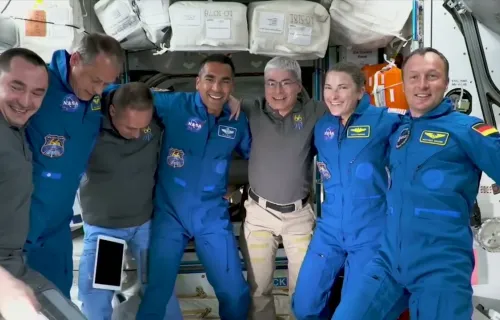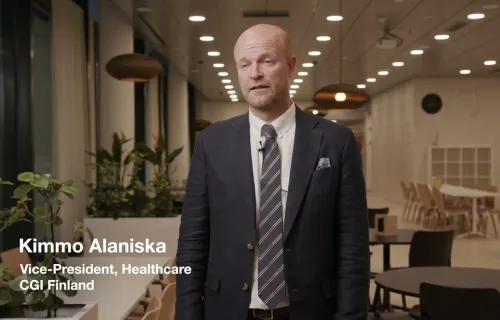In this podcast, Stuart Parsons, CGI’s Director of Health and Social Care, UK and Australia and Carla Dix, Strategic Innovations Program Lead at Llesiant Delta Wellbeing, discuss the future of health and care. They explore the current key priorities of the health and care industry, the barriers that prevent change, and they share their predictions for how health and care will evolve over the next decade.
CGI and Delta Wellbeing: a strategic, long-term partnership
Delta Wellbeing has selected CGI as its long-term strategic partner to improve health and social care in West Wales and beyond. Through its new digital transformation program, Delta CONNECT, Delta Wellbeing is implementing a new model of self-help and proactive care to improve wellbeing, help people stay independent and reduce demands on long-term or acute health and social care problems. The initial focus of this partnership is the digitization of Delta Wellbeing's Telecare services in preparation for the upcoming analog switch-off in 2025, creating a platform for new digital health and care service delivery.
The future of health and care: Key priorities
Across the UK and around the globe, health and social care professionals are facing significant challenges that include an increased demand for services, workforce shortages, and budget constraints. As a result, integrating services to create efficiencies across the healthcare ecosystem is a key priority. Although integration has been a topic of discussion for the past few years, it has yet to be achieved across health and social services. Becoming more efficient in the ways that staff do their jobs and cutting both waste and silo working will help drive change that provides better outcomes for clients and patients.
To support the pressure points in health and care services and to make changes that provide a new model of delivery, the focus must be on proactive lifestyle monitoring and keeping people safe and well in day-to-day life. A maximized technology and data approach will help us learn more about individuals and tailor care to deliver more personalized service.
Harnessing technology to overcome barriers and drive change
Today, healthcare professionals tend to work in silos with health on one side, social care the another, and a myriad of parties in between. Breaking down barriers between these services depends on data sharing. Interconnectivity will help transform information into insight and improve and enhance our understanding of the individual as we gather and consolidate information from all aspects of their lifestyle and the medical devices they're using. A standardized single platform approach for the collection of data will facilitate that digital transformation. In addition, incorporating these systems can help the individual and their circle of care become more informed and more involved in their care delivery, ultimately improving their health outcomes.
Looking ahead: Predictions for the healthcare industry
Over the next decade, we have an opportunity to make a significant difference to our service users. A system that allows us to share data and gain a 360 view of individuals will enable efficient systems, effective staff, and ultimately, better outcomes across our health and social care services.
A digital transformation program, like Delta CONNECT, will eventually allow us to construct a single, cross-organizational view of an individual from a more place-based perspective. That could be repeatable and a single approach for all regions, with a capability to provide truly bespoke care service that results in improved health outcomes.
Ideally, this technology would become part of our everyday lifestyles in a ubiquitous, helpful way that builds an accurate picture of an individual, how best to keep them well, and how best to help them when they need it.
For more insights from Stuart Parsons and Carla Dix, related to the partnership between Delta Wellbeing and CGI, listen to the full podcast.
Listen to the first podcast in the series to learn about the biggest challenges facing the health and care industry, and how digital technology can help overcome them. For questions or comments, contact Stuart Parsons.
Read the transcript:
- Introduction
-
Divya Bedi: Hello, and welcome to our second in a three-part podcast series, focusing on digital health and care, where we will not only be looking at the current challenges in the marketplace, but how the right digital technology and strategic partnerships can overcome these and pave the way for new models of care, putting the patients at the heart of the services being delivered. My name is Divya Bedi, Project Manager, CGI, and I will be your host for this series. CGI has been selected by Delta Wellbeing as its long-term strategic partner to improve health and social care in West Wales and beyond, through its new digital transformation program. The Delta Connect program is transforming the way health and social care is delivered, implementing a new model of self-help and proactive care to improve wellbeing, help people stay independent, and reduce demands on long-term or acute health and social care. The initial focus of the partnership between CGI and Delta is the digitization of Delta Wellbeing's telecare services, in preparation for the upcoming analog switch-off in 2025, creating a platform for new digital health and care service delivery. In our first podcast, with Paul and Stuart, we covered the current challenges we are facing, and the role technology has in overcoming these. Today, we will be focusing on the future of health and care over the next few years. With me, we have Carla Dix, Strategic Innovations Program Lead from Delta Wellbeing.
Carla Dix: Hi, there.
Divya Bedi: And Stuart Parsons, Director Consulting Services for Health and Care from CGI.
Stuart Parsons: Hi, Divya.
- The future of health and care: Key priorities
-
Divya Bedi: Hi, guys. Let me start by asking my first question. What are some of the key priorities moving forward to addressing health and care over the next few years?
Carla Dix: Well, from our perspective here in West Wales, there are some significant challenges that all our health and social care colleagues are actually going to be facing. And I suppose it's not really unique to West Wales. This is something that we're seeing across the whole of the UK. We've got still that increased level of demand for those services. We have workforce challenges and some of those budget constraints that we hear about regularly across our media. I think certainly for us, a priority is about that integration—to be able to provide those efficiencies across health and social care.
We've had lots of conversations about integration over the years, but I think we're not really at a point where there is a level of true integration. Quite lucky locally that we have a little bit more of a joined-up approach, certainly through the transformation projects. For things like our connect service, we work very closely across health and social care. We've been afforded the opportunities to really drive some of that change that will allow us to be able to join things up a little bit more. As I said, to become more efficient in the ways that our staff are able to do their jobs, to cut out some of that waste, cut out that silo working.
I think there are obvious benefits there, not only to our staff and to be able to provide better outcomes for our clients, but also about meeting some of those budget challenges, shall we say. What we're aiming to do then is, I suppose, change the way we're working by being proactive, by being preventative. I appreciate that sometimes that's a bit of a challenge in the world that we're in because we have got all of this demand that needs us to be reactive. However, we have to do something different to be able to support some of those pressure points in our health and care services and make some change by providing a new model of delivery, really.
Stuart Parsons: To match Carla's thinking, I think for me, it's a real focus on proactive lifestyle monitoring and keeping us safe and well in our day-to-day lives. Through this maximized technology that underpins the new service model, and tuning, and data approach that creates a proven case study, we're able to tailor care to individuals as we learn more about them, and the care they need to deliver a more personalized service provision. Commissioners have often historically struggled on what to provide, but I'm conscious when I say this, that I recognize there's still quite an education piece in all this, to undertake and explain the benefits of this type of new approach, and how all that technology can come together, as well.
- Harnessing technology to overcome barriers and drive change
-
Divya Bedi: Absolutely. Like with this, what do you think are some of the barriers to change, and how can technology address these barriers and drive the change forward?
Carla Dix: I think we've still got some challenges with the technology. I think we still work within a fairly, well, I'd say it's quite an old-fashioned world with the analog side of it. However, the digital switch, I think, is going to push the boundaries, and allow us to push the boundaries, certainly. I think we're coming from a perspective, and again, this is about the tech that's out there. How do we actually make best use of the data that we've actually got coming from that? We need to provide those actionable insights, I suppose, and be proactive, and try to be predictive in the way they work, and to be more effective in the interventions that we put in place, and how we actually work for the clients.
I think giving us the opportunity to have a 360 view of a client, because we tend to work in those silos, where you've got health on one side, social care on another, and a myriad of other parties that actually work with these individuals and they never join up, and they never necessarily work together. You've got people bouncing around systems, really. I think if we're able to join things up, and get that data working, because invariably, we've not got one system for all, then we're able to make better use of that data. Also, with the tech that's already out there, that people are already using, it will allow us to encourage individuals to bring their own devices to the table, so we can actually utilize their data and monitor.
Again, back to what Stuart said about that monitoring of patterns and behavior, allowing us to then be better prepared for what may come through in the future, really. It also allows us to support that individual who may end up in an acute situation, who may already be used to them being monitored, and being supported by services like ours. Allow them to perhaps take a little bit more interest in their own health and social care world, and become engaged and co-produce in those areas, which I think allows then for a much smoother transition into some of those perhaps statutory service provisions that may be needed. Allows us, again, like I said, to provide better outcomes for our clients, ultimately.
Stuart Parsons: Yes, for me, I think with the breaking down of barriers between data sharing, there's naturally a huge business change element that goes into that. Having a standardized single platform approach for the collection of data just really helps us transform all that information into insight, and improve and enhance understanding of the individual, as we gather and consolidate information from all aspects of their lifestyle and the devices they're using, as Carla mentioned. It's that type of change when a real plethora of systems can be incorporated that can also help the individual in their circle of care around them, be more informed and more involved in their care delivery and support the choices they make. What we would like to see is ultimately that improving people's health outcomes.
- Looking ahead: Predictions for the healthcare industry in the next decade
-
Divya Bedi: With these new improvements, how do you think health and care industry will look like in the next 5 to 10 years?
Carla Dix: I think if I look a little inwards from a Wales perspective, we have an opportunity to make a significant difference to our service users, because we're quite a small nation at the end of the day. Ultimately, our population have similar needs and similar requirements, really. With a system that's going to allow us to share data, and to have that 360 view of individuals, we're going to be able to do things differently. We're going to be able to have efficient systems, allow our staff to be more effective, and to provide better outcomes across our health and social care services. I think the reality of it is, at this present time, it's too risky not to do something differently than it is to take on those risks of actually transforming and being innovative and pushing the boundaries of what we're able to do. Something with regards to that sort of digital platform, yes, we have to do that. I think the work that we're hoping to do with CGI, or will be doing with CGI, is going to take things to the next level, and I think transform the way that health and social care services look, certainly in the not-too-distant future, as well.
Stuart Parsons: Yes, like Carla, the exciting thing for me is that what we're talking about now, where we're headed, what we're creating, should allow us to construct a single view of an individual from a more place-based perspective, so the cross-organizational view. Also, that could be repeatable and a single approach for all regions, with a capability that's going to provide a personalized flavor for each individual that will result in what I believe to be a truly bespoke care service. For me as an individual, I, again, believe it can result in improved health outcomes for me, too, and for those individuals. While we're keeping individuals and those around that person in their social care also informed, so it's just fantastic to think about, really, in that sense. If I dared to dream, it would be the use of this technology as part of my everyday lifestyle that's ubiquitous in a helpful way, building this picture of me and how best to keep me well and, obviously, when I need it, how best to help me.
Divya Bedi: Thank you for your time today. I hope you found this very informative and some great points were raised by both Carla and Stuart. I hope you're excited for the final podcast where we will continue this conversation with Gareth Rees and discuss how partnering can bring in success for health and care. If you want to find out more, please visit the CGI website or reach out to us on LinkedIn. Thank you.





